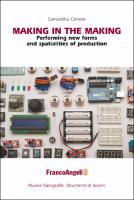Making in the making
Performing new forms and spatialities of production
| dc.contributor.author | Cenere, Samantha | |
| dc.date.accessioned | 2022-03-03T11:39:08Z | |
| dc.date.available | 2022-03-03T11:39:08Z | |
| dc.date.issued | 2021 | |
| dc.identifier | ONIX_20220303_9788835131618_18 | |
| dc.identifier | OCN: 1313557204 | |
| dc.identifier.uri | https://library.oapen.org/handle/20.500.12657/53223 | |
| dc.description.abstract | During the last two decades, we have witnessed the spreading of shared spaces of work and production in different urban contexts, attracting attention from both policymakers and scholars in economic geography and urban studies. In particular, Fablabs are considered open workshops for grassroots innovation, which is enabled by the availability of shared digital fabrication machines and by the possibility to share knowledge with peers and work together on a project, either in person or online. People attending Fablabs are usually called Makers and, according to the discourse surrounding them, they are deemed the harbingers of a democratisation of production and part of a broader transformation of urban economies and work in the era of digital capitalism. The book is the result of a PhD research on Makers and Fablabs in Turin, mainly based on an ethnographic observation conducted at Fablab Torino. It offers an original theoretical framework inspired by the recent strand of post-structuralist economic geography, together with a reliance on ontological tenets coming from Actor-Network Theory and Science and Technology Studies. Adopting an interdisciplinary approach, the study is therefore of interest for scholars in different social sciences who study the reconfiguration of work and production in cities and digitally mediated economic transformations. The analysis unpacks the enactment of Making as a new form of work and production through three different conceptual foci – knowledge, materiality, and work. Notably, the inquiry looks at how Fablab Torino and the urban ‘Maker scene’ in Turin are performatively enacted through the entanglement between economic theories on the phenomenon with specific socio-technical arrangements aiming at making those economic theories true. The geographical relevance of the phenomenon is identified not in some static spatial configuration but, on the one hand, in the heterogeneous and emergent spatialities that emerge from individual practices of Making and, on the other, in the sociomaterial practices of organising that bring into being economic organisations such as Fablabs. | |
| dc.language | English | |
| dc.relation.ispartofseries | Nuove Geografie. Strumenti di lavoro | |
| dc.subject.classification | thema EDItEUR::G Reference, Information and Interdisciplinary subjects::GT Interdisciplinary studies::GTM Regional / International studies | en_US |
| dc.subject.other | maker, fablab, digital, work, geography, ANT | |
| dc.title | Making in the making | |
| dc.title.alternative | Performing new forms and spatialities of production | |
| dc.type | book | |
| oapen.relation.isPublishedBy | e2ddfb5e-9202-4851-8afe-1e09b020b018 | |
| oapen.relation.isbn | 9788835131618 | |
| oapen.pages | 270 | |
| oapen.place.publication | Milan |

